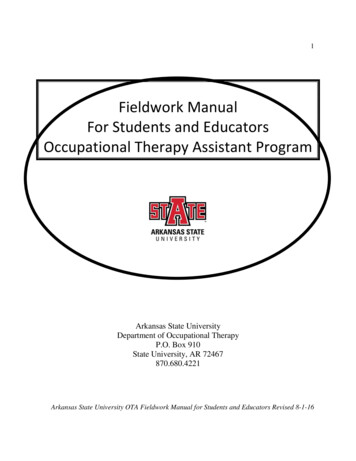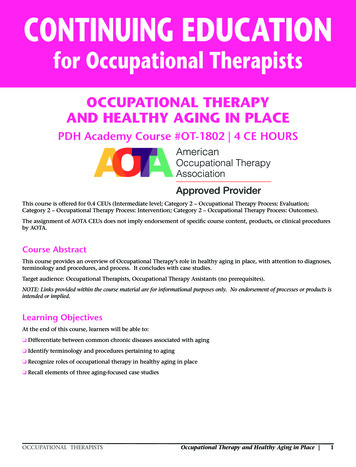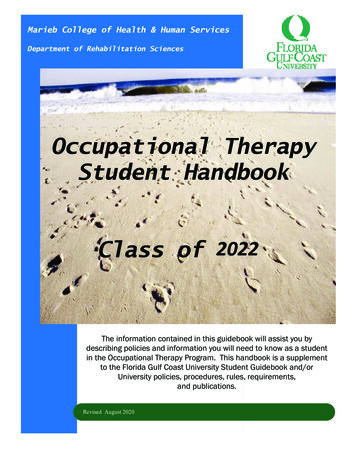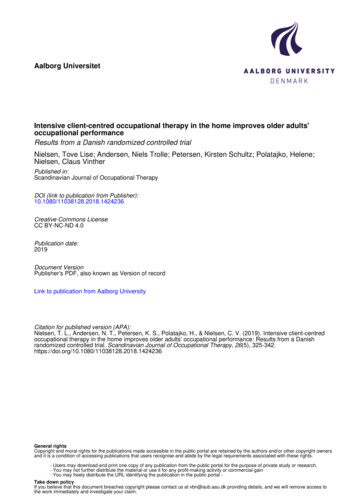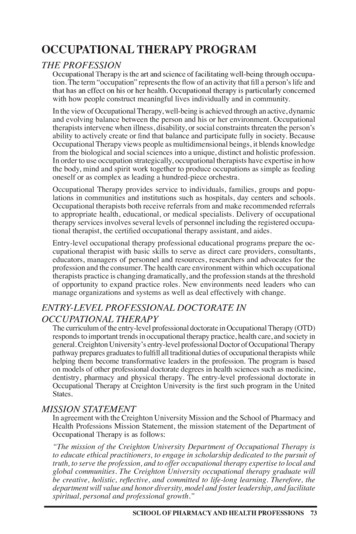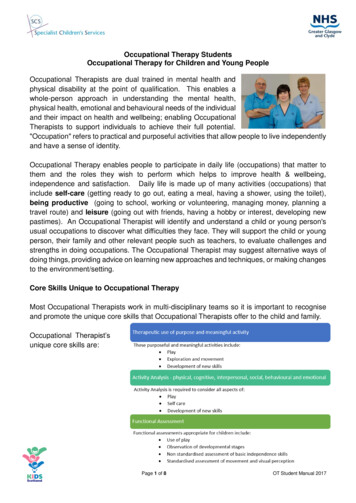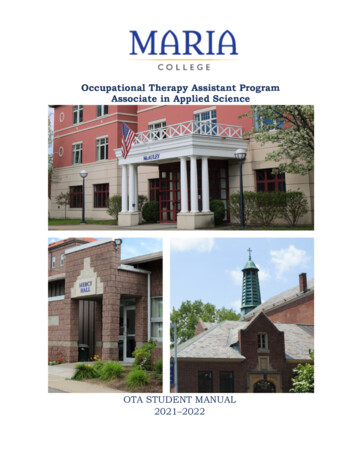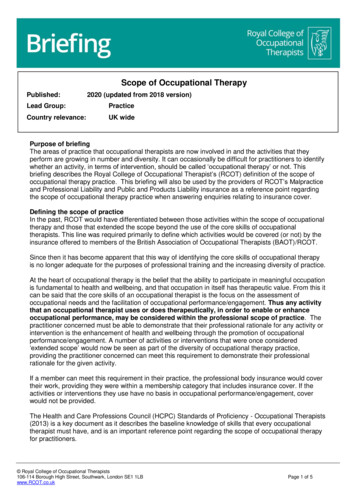
Transcription
Scope of Occupational TherapyPublished:2020 (updated from 2018 version)Lead Group:PracticeCountry relevance:UK widePurpose of briefingThe areas of practice that occupational therapists are now involved in and the activities that theyperform are growing in number and diversity. It can occasionally be difficult for practitioners to identifywhether an activity, in terms of intervention, should be called ‘occupational therapy’ or not. Thisbriefing describes the Royal College of Occupational Therapist’s (RCOT) definition of the scope ofoccupational therapy practice. This briefing will also be used by the providers of RCOT’s Malpracticeand Professional Liability and Public and Products Liability insurance as a reference point regardingthe scope of occupational therapy practice when answering enquiries relating to insurance cover.Defining the scope of practiceIn the past, RCOT would have differentiated between those activities within the scope of occupationaltherapy and those that extended the scope beyond the use of the core skills of occupationaltherapists. This line was required primarily to define which activities would be covered (or not) by theinsurance offered to members of the British Association of Occupational Therapists (BAOT)/RCOT.Since then it has become apparent that this way of identifying the core skills of occupational therapyis no longer adequate for the purposes of professional training and the increasing diversity of practice.At the heart of occupational therapy is the belief that the ability to participate in meaningful occupationis fundamental to health and wellbeing, and that occupation in itself has therapeutic value. From this itcan be said that the core skills of an occupational therapist is the focus on the assessment ofoccupational needs and the facilitation of occupational performance/engagement. Thus any activitythat an occupational therapist uses or does therapeutically, in order to enable or enhanceoccupational performance, may be considered within the professional scope of practice. Thepractitioner concerned must be able to demonstrate that their professional rationale for any activity orintervention is the enhancement of health and wellbeing through the promotion of occupationalperformance/engagement. A number of activities or interventions that were once considered‘extended scope’ would now be seen as part of the diversity of occupational therapy practice,providing the practitioner concerned can meet this requirement to demonstrate their professionalrationale for the given activity.If a member can meet this requirement in their practice, the professional body insurance would covertheir work, providing they were within a membership category that includes insurance cover. If theactivities or interventions they use have no basis in occupational performance/engagement, coverwould not be provided.The Health and Care Professions Council (HCPC) Standards of Proficiency - Occupational Therapists(2013) is a key document as it describes the baseline knowledge of skills that every occupationaltherapist must have, and is an important reference point regarding the scope of occupational therapyfor practitioners. Royal College of Occupational Therapists106-114 Borough High Street, Southwark, London SE1 1LBwww.RCOT.co.ukPage 1 of 5
The HCPC recognise the changing nature of a practitioner’s scope of practice, defining it as:‘the area or areas of your profession in which you have the knowledge, skills and experience topractise lawfully, safely and effectively, in a way that meets our standards and does not pose anydanger to the public or to yourself’.‘We recognise that a registrant’s scope of practice will change over time and that the practice ofexperienced registrants often becomes more focused and specialised than that of newly registeredcolleagues. This might be because of specialisation in a certain area or with a particular client group,or a movement into roles in management, education or research’.(HCPC 2013, p4).Professional registrationAn occupational therapist must be registered with the Health and Care Professions Council (HCPC) inorder to use the title and to practise. In order to register and maintain their registration, practitionersmust read and agree to abide by the HCPC standards and requirements. They do this by making aprofessional declaration that: they have continued to practise their profession since their last registration (or have met thereturn to practice requirements);they have continued to meet the HCPC standards of proficiency for the safe and effectivepractice of their profession;there has been no change relating to their good character;they have continued to meet the HCPC standards for continuing professional development;andthey have (or will have) an appropriate professional indemnity arrangement in place when theypractise.The HCPC take a very broad understanding of ‘practising your profession’ as ‘drawing on yourprofessional skills and / or knowledge in the course of your work.’ They state that the practitioner mustmake a personal decision about whether they are doing this. Education, management and researchare seen as part of practice, as are voluntary, periodic, part-time roles and those less distinct, butrelated to the profession, where the practitioner is using their professional skills in some capacity(HCPC 2017, p8).Occupational therapists who are in generic/general manager roles can therefore still register withHCPC, their 'service users' are their staff / others they work with, and they can consider how theyenhance the occupational performance of the people they work with e.g. empowering others / staffdevelopment/service improvement.Therefore, an occupational therapist does not have to be in a post with the job title‘occupational therapist’ in order to practice their profession/meet HCPC registrationrequirements.InsuranceThe RCOT Malpractice and Professional Liability and Public and Products Liability insurance coversthe practice of occupational therapy as detailed above – if you are drawing on your professional skillsand/or knowledge in the course of your work, then you can declare that you are practising yourprofession. If you can demonstrate that your professional rationale for any activity or intervention is Royal College of Occupational Therapists106-114 Borough High Street, Southwark, London SE1 1LBwww.RCOT.co.ukPage 2 of 5
the enhancement of health and wellbeing through the promotion of occupationalperformance/engagement, the BAOT/RCOT insurance will provide cover.Please note: the above insurance covers ‘Professional’ members of RCOT (working at any age) andnot members in the ‘Retired’ category. A retired member is defined as someone who no longerpractices as an occupational therapist but who has previously been an occupational therapistprofessional member of the RCOT for at least one year.CompetenceRCOT’s Code of Ethics and Professional Conduct states:You must only provide services and use techniques for which you are qualified by education, trainingand/or experience. These must be within your professional competence, appropriate to the needs ofthe service user and relate to your terms of employment. COT (2015), section 5.1This means that, whatever the activity or intervention being used, the practitioner must bedemonstrably competent to use it; that the activity must be appropriate to the assessed needs of theservice user; and that the activity is recognised by the employer as appropriate to the reason for thepractitioner’s employment. It is advisable to confirm that the employer’s vicarious liability insurancewill cover the activity being used.Where an occupational therapy practitioner recognises that a particular intervention or activity isrequired that is outside of their normal scope of work or level of competence, they must refer theservice user on to the most appropriate professional to provide the service. They must not attempt toprovide any intervention for which they are not currently qualified by education, training or experience.An occupational therapist should not be asked to carry out an activity that they are not competent todo, unless adequate training and support is provided. They have the right to refuse such a request ifthey feel that they are not competent to undertake the task required.Where the practice of an occupational therapist is unusual or diverse, the support required for safeand effective practice may not come from another occupational therapist, but someone who has thenecessary skills, knowledge and experience in the given activity.Any practice should be underpinned by research and best available evidence where possible.Frequently asked questionsThe Professional Practice Enquiries Service is regularly contacted by RCOT members regardingscope of practice. Members enquire whether the intervention they wish to provide/are providing canbe considered to be part of their occupational therapy practice and if so, would the RCOT Malpracticeand Professional Liability and Public and Products Liability insurance provide cover.The response to enquiries such as these always focuses on whether the intervention the occupationaltherapist: focuses on enhancing/maintaining occupation for the person they are working with uses their occupational therapy knowledge, skills and experience is professionally competent to carry out the intervention. Royal College of Occupational Therapists106-114 Borough High Street, Southwark, London SE1 1LBwww.RCOT.co.ukPage 3 of 5
Examples: If you are trained and competent to deliver cognitive behavioural therapy (CBT) and you areusing this as a tool to enable people to continue participating in their occupations, you candemonstrate that you are working within the occupational therapy scope of practice. If you are expected to take on ‘generic’ duties such as completing a physical health check(and are trained and competent to do so), you can still demonstrate that you are workingwithin the occupational therapy scope of practice, if your main interventions are occupationfocussed. Monitoring people’s blood pressure or weight maybe an important element inmaintaining/improving their health and their ability to participate in daily life. Minimisinghandoffs is more person-centred and cost effective.ConclusionThe increasing diversity and breadth of occupational therapy practice is observable, with growingnumbers of role-emerging posts (providing an occupation-focussed service in a new area of practice,e.g. care homes); non-traditional posts (working outside of traditional health and social care services,e.g. charities) and providing a non-traditional occupational therapy role in a traditional setting,possibly using more aspects of occupational science.There may be a potential risk in diversification of losing the professional identity, but with astrengthening of the focus on meaningful occupation, this broadening of the range and application ofoccupational therapy may be seen as a positive opportunity.Further readingCollege of Occupational Therapists (2017) Professional standards for occupational therapy practice.London: COT.Available at: e of Occupational Therapists (2014) Learning and development standards for pre-registrationeducation. London: COT.Available at: lications/member/education-anddevelopmentRoyal College of Occupational Therapists Improving Lives, Saving Money Campaign.Available at: eyRoyal College of Occupational Therapists Occupation centred practice briefing.Available ational-therapy-topics/scope-practiceRoyal College of Occupational Therapists Tax relief and insurance for RCOT members.Available hip/tax-relief-and-insurance-rcot-membersRoyal College of Occupational Therapists Occupational therapy and complexity: defining anddescribing practice.Available at: https://www.rcot.co.uk/node/1203 Royal College of Occupational Therapists106-114 Borough High Street, Southwark, London SE1 1LBwww.RCOT.co.ukPage 4 of 5
ReferencesCollege of Occupational Therapists (2015) Code of ethics and professional conduct. London: COT.Available at: lications/downloads/rcot-standardsand-ethicsHealth and Care Professions Council (2013) Standards of proficiency - occupational therapists.London: HCPC.Available at: ficiency/occupational-therapists/Health and Care Professions Council (2017) Returning to practice. London: HCPC.Available at: practice/All links accessed on 29.9.20 Royal College of Occupational Therapists106-114 Borough High Street, Southwark, London SE1 1LBwww.RCOT.co.ukPage 5 of 5
The RCOT Malpractice and Professional Liability and Public and Products Liability insurance covers the practice of occupational therapy as detailed above - if you are drawing on your professional skills and/or knowledge in the course of your work, then you can declare that you are practising your profession.

